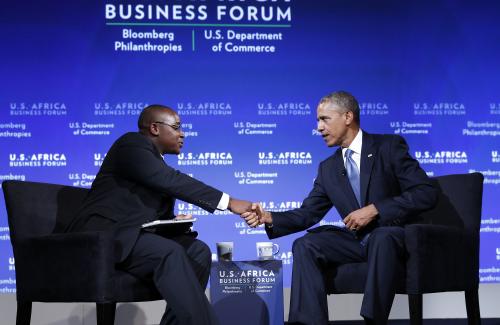Editor’s Note: This week’s Figures of the Week examine the makeup and trends of corporations in Africa as we approach the second U.S.-Africa Business Forum. Building on the forum in 2014, this year’s meeting again hosts heads of state, U.S. CEOs, and African business leaders, but aims to go beyond past commitments and towards effective implementation. For more on coverage on the forum, see here.
Next week, the U.S. Department of Commerce, alongside Bloomberg Philanthropies, will host the second U.S.- Africa Business Forum, with the aim of bringing together African heads of states and U.S. and African CEOs. In view of next week’s summit, this post looks at the current state of Africa’s corporate climate.
This week, the McKinsey Global Institute (MGI) released a report entitled “Lions on the move II: Realizing the potential of Africa’s economies,” in which it outlines findings from MGI’s data on Africa’s corporate environment. One of the findings in the report is that African firms are more profitable than their global peers, notably across the following sectors: wholesale/retail, food and agri-processing, health care, financial services, light manufacturing, and construction (Figure 1).
Figure 1: Profitability of African companies vs. rest of world by sector, 2013-14, measured in net operating profit less adjusted taxes (NOPLAT) as % of revenue
 Source: McKinsey Corporate Performance Analytics; McKinsey Global Banking Pools; McKinsey Global Institute analysis
Source: McKinsey Corporate Performance Analytics; McKinsey Global Banking Pools; McKinsey Global Institute analysis
Despite their relatively higher profitability, the report states that corporate Africa suffers from a lack of large firms, companies with an annual revenue of $500 million or higher. On a global scale, large enterprises are the primary drivers of growth. They attract investment, promote research and development, enhance workers’ productivity, and greatly contribute to a nation’s corporate tax base. According to MGI, in Africa, the largest 100 companies contribute 50 to 60 percent of corporate taxes.[1] In addition, large firms foster the creation of small and medium enterprises through the development of vertical and horizontal linkages. African-owned large companies mainly operate regionally, which limits their reach and scale.
Also according to the report, Africa’s large companies are disproportionately concentrated in southern Africa. South Africa alone is home to 300 large companies, i.e., 49 percent of all large companies in the sub-continent. Comparatively, central Africa hosts 3 percent of large companies (Figure 2). South Africa’s disproportional hold of large companies has historical roots. In the 19th century, South Africa experienced a resource boom that attracted foreign investment into the country and triggered a wave of industrialization. During apartheid, amid sanctions imposed by foreign governments, South Africa’s economy was largely isolated; consequently, they developed large, diversified firms focused on the domestic market.
Figure 2: The geographical distribution of Africa’s large firms
 Source: MGI African Companies Database; McKinsey Global Institute analysis
Source: MGI African Companies Database; McKinsey Global Institute analysis
In Africa, 56 percent of large firms are African-owned, 27 percent are foreign-based multinationals, and 17 percent are state-owned. Multinationals are largely concentrated in the resource and food sector, while African-owned companies mainly dominate the light manufacturing and construction sectors (Figure 3). While African-owned firms rarely expand out of their respective home base, foreign-based companies largely operate across borders. Interestingly, African large companies’ unwillingness to expand to other African markets has not hindered profitability. In MGI’s study of Africa’s 100 top companies, they find that the following three factors have contributed to the firms’ profitability: building a strong base in their home markets, focusing on one sector, and pushing for best practices and executions.
Figure 3: The sectoral distribution of large firms Africa, by ownership type
 Source: MGI African Companies Database; McKinsey Global Institute analysis
Source: MGI African Companies Database; McKinsey Global Institute analysis
Next week’s U.S.-Africa Business Forum offers the opportunity for CEOs and policymakers to use these findings to determine effective policies to grow business in Africa.
[1] Estimate only covers a sample of African countries.







Commentary
Figures of the week: For the US-Africa Business Forum, the current state of corporate Africa
September 16, 2016